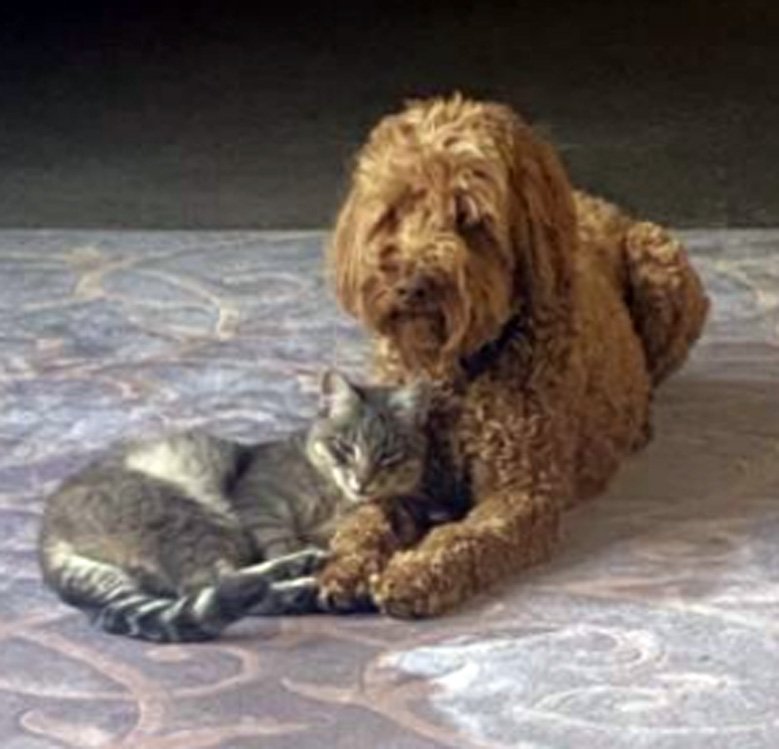
AJ Hackett Bungy New Zealand co-founder and managing director Henry van Asch and his wife, Caroline Hutchison, appeared before the Queenstown Lakes District Council’s dog control committee panel yesterday after their 10-year-old pet dog, Alfie — which Mr van Asch quipped had "a pet cat he cleans every day with his tongue" — was slapped with the classification in February.

"In my countless experiences with Alfie, he has been loving, gentle and happy," one said.
"He is a well-behaved and well-trained companion who brings nothing but joy and positivity to those around him," another said.
The hearing followed an incident allegedly involving Alfie and German pointer-lagotto Otto on a neighbouring Dalefield property last October.
Otto, owned by Timothy Hardley, was also given the dangerous classification.
Mr Hardley described Otto as "a great mate to other dogs, and a great mate to my five grandchildren, who are all under 7 years old" .
A report by senior animal control officer Hannah Dennison said animal control officer Rachel Ramsden received a call from the owner of some sheep just after 1pm on October 27, advising two dogs had attacked his sheep.
Alfie was still in the paddock, but Otto had left the scene before Ms Ramsden and animal control manager Carrie Edgerton arrived.
In the paddock were two dead ewes and one dead lamb, one ewe with facial injuries and another with a large amount of blood on it, and injuries to its abdomen, face and back.
Four lambs had torso injuries and a fifth had "severe injuries", while two other lambs were missing.
One ewe was subsequently euthanised, and several lambs required an injectable antibiotic.
Under the Dog Control Act 1996, the council had to classify a dog as dangerous where it had reasonable grounds to believe, based on sworn evidence, the dog constituted a threat to the safety of any person, stock, poultry, domestic animal or protected wildlife.
The classifications were made because of the sheep owner’s sworn evidence attesting to "aggressive behaviour" by both dogs.
Mr van Asch and Ms Hutchison were represented by Todd & Walker Law principal Graeme Todd, who told the panel — comprising Crs Lyal Cocks (chairman), Melissa White and Cody Tucker — they had no evidence before them to uphold the classification for Alfie.
"Nobody has given any evidence of having seen anything ... other than a dog being present on the property at that time."
He noted photographs produced from the day showed extensive bleeding to the stock, but there was no evidence of any blood on the dog "at all" and as it sat quietly for 10 minutes when confronted, no evidence of any aggressive behaviour.
Mr Todd said as well as being a family pet, Alfie was also a support dog, attending Tom Pryde House in Arrowtown where he spent time with Living Options clients to help them gain confidence around dogs.
He had also visited, on many occasions, Cecil Peak Station and had never been interested in the stock, nor had he bothered any other dogs, the family’s two pet lambs, which grew into sheep, or any of their other animals.
Similarly, prior to the alleged attack, Otto had never shown interest in any stock.
Cromwell-based dog trainer Gary Wulff stock-tested Otto, and found he would not get closer than 10m to sheep while off lead.
Ms Hutchison said Alfie now wore an electric collar, with one spare, they had a bank of batteries and their entire property was wired.
"He will live with a collar regardless of what you decide ... Those roaming days, for Alfie, are gone."
He could not even be dragged to the boundary now, had not left the property for six months, unless by car, and they immediately installed long runs on wires.
They had also provided a fenced area, and a muzzle.
Mr Hardley said Otto was also only leaving the property by car, he now wore a trackable collar and there was electric fencing around his property.
The panel reserved its decisions in respect to both classifications. — Additional reporting Olivia Judd












